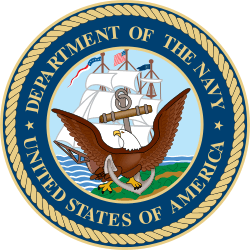List of United States Navy aircraft squadrons
This is a list of United States Navy aircraft squadrons. Deactivated or disestablished squadrons are listed in the List of Inactive United States Navy aircraft squadrons. Navy aircraft squadrons are typically composed of several aircraft (from as few as two to as many as several dozen), the officers who fly them and the men and women that maintain them. Most squadrons also have a number of other administrative support personnel. Some of the activities listed are not technically "squadrons", but they all operate U.S. Navy aircraft in some capacity.
Squadrons and their history are listed in the Dictionary of American Naval Aviation Squadrons (DANAS).
Squadron organization

Active duty squadrons are typically commanded by a Commander. Second in command is the Executive Officer (XO), also a Commander. The XO typically assumes command of the squadron after approximately 15 months. There are typically four functional departments - Operations, Maintenance, Safety/NATOPS, and Administration - each led by a Lieutenant Commander functioning as the Department Head. Within the departments are Divisions (each typically headed by a Lieutenant) and Branches (headed by a Lieutenant, junior grade or a Chief Petty Officer).
Reserve squadrons are also commanded by a Commander, with another Commander as the XO who will also assume command after approximately 15 months. However, reserve squadron demographics are typically older and more senior in rank than their active duty squadron counterparts. Department Heads in reserve squadrons are typically senior Lieutenant Commanders, although some may be recently promoted Commanders. Where this difference in maturity level becomes more apparent is at the Division Officer level. Since most officers in reserve squadrons previously served on active duty in the Regular Navy in a flying status for eight to ten or more years, they are typically already Lieutenant Commanders, or achieve that rank shortly after transferring to the Navy Reserve. As a result, Lieutenants are a minority and Lieutenants, junior grade, practically non-existent in reserve squadrons. As a result, Divisions are typically headed by Lieutenant Commanders and Branches by Lieutenants, Senior Chief Petty Officers or Chief Petty Officers.
Types of squadrons
Navy aircraft are classified by Type (rotary wing, fixed wing), Model (e.g. SH-60), and Series (e.g., SH-60B versus SH-60F).
Squadrons can be categorized in a number of ways: Active versus Navy Reserve, land-based versus sea-based, fixed wing versus rotary wing (helicopter) vs Unmanned aerial vehicle (UAV), and by mission. Unlike the USAF, US Army, and USMC, the US Navy does not typically refer to other organizations (such as maintenance or medical units) as "squadrons". An exception to this is that US Navy destroyers and submarines are administratively grouped by "squadrons".
Active squadrons are those in the regular US Navy. Reserve squadrons are in the US Navy Reserve and are manned by a combination of full-time and part-time reservists. For the most part, there is no way to know by the squadron's name alone whether it is an active or reserve squadron. There are Reserve elements of many Active squadrons, and active duty personnel serving in many Reserve squadrons. In general, reserve squadrons share the same missions as their active counterparts, although there are Reserve missions (e.g., Adversary and Fleet Logistics Support) that have no Active counterpart.
At any one time, the US Navy has approximately 600 aircraft that are associated with particular ships. There are also several thousand additional Navy aircraft that are capable of shipboard operations, but are not associated with a ship. The Navy also has several hundred land-based aircraft that are not capable of shipboard operations.
Squadrons are listed here by type (fixed/rotary wing) and by mission.
Squadron names
Navy aircraft squadrons can be properly referred to by three different names. The names can give an indication of the squadron's mission and type of aircraft.
- The Formal name (e.g., Strike Fighter Squadron EIGHT SIX) indicates the mission.
- A subset of the formal name is a Navy acronym format in capital letters, e.g., STKFITRON EIGHT SIX
- The Informal name (e.g., VFA-86) also indicates the type and mission, as each of the letters has a meaning. In this case, "V" stands for fixed wing, "F" stands for fighter, and "A" stands for attack.
- Nickname – e.g., "Sidewinders".
Fixed Wing Squadrons
Most Navy fixed wing squadron informal names start with the letter "V". An exception to this was the use of "RVAH" to denote Reconnaissance Attack Squadrons which operated the North American RA-5C Vigilante RA-5C Vigilante during the 1960s and 1970s.
Electronic Attack
A typical Electronic Attack Squadron consists of five Boeing EA-18G Growlers. The primary mission of the Growler is Electronic Attack (EA), also known as Suppression of Enemy Air Defenses (SEAD) in support of strike aircraft and ground troops by interrupting enemy electronic activity and obtaining tactical electronic intelligence within the combat area. Navy Electronic Attack squadrons carry the letters VAQ (V-fixed wing, A-attack, Q-electronic). Most VAQ squadrons are carrier based, however a number are "expeditionary", deploying to overseas land bases. When not deployed (either on land or carrier), they are home-ported at NAS Whidbey Island. The exception is VAQ-141, which is forward deployed to NAF Atsugi, Japan.[1]
| Squadron Name | Insignia | Nickname | Aircraft[2] | Notes |
|---|---|---|---|---|
FRS NAS Whidbey Island Established May 1, 1961 | ||||
CVW-3 NAS Whidbey Island Established September 1, 1959 | ||||
CVW-8 NAS Whidbey Island Established May 1, 1946 | ||||
Expeditionary NAS Whidbey Island Established November 1, 1955] | ||||
NAS Whidbey Island Established March 4, 1969 | ||||
NAS Whidbey Island Established June 17, 1969 | ||||
NAS Whidbey Island Established May 15, 1969 | ||||
NAS Whidbey Island Established April 6, 1973 | ||||
NAS Whidbey Island Established December 14, 1973 | ||||
NAS Whidbey Island Established February 27, 1976 | ||||
NAS Whidbey Island Established July 1, 1983 | ||||
NAS Whidbey Island Established October 1, 1985 | ||||
NAF Atsugi Established July 1, 1987 | ||||
NAS Whidbey Island Established April 1, 1997 | ||||
Tactical Support Wing NAS Whidbey Island |
Carrier Airborne Early Warning
Each Carrier Airborne Early Warning squadron usually consists of four E-2C Hawkeyes, The Hawkeye's primary mission is to provide all-weather airborne early warning, airborne battle management and command and control (C2) functions for the carrier strike group and Joint Force Commander. Additional missions include surface surveillance coordination, air interdiction, offensive and defensive counter air control, close air support coordination, time critical strike coordination, search and rescue airborne coordination and communications relay. The E-2 Hawkeye and C-2 Greyhound are built on the same airframe and have many similar characteristics. For this reason, both aircraft are trained for in the same Fleet Replacement Squadron.[3]

| Squadron Name | Insignia | Nickname | Aircraft | Notes |
|---|---|---|---|---|
NAS Pt. Mugu Established April 20, 1967 | ||||
NAS Pt. Mugu Established April 20, 1967 | ||||
NAF Atsugi Established April 20, 1967 | ||||
NAS Pt. Mugu Established April 20, 1967 | ||||
NAS Pt. Mugu Established July 1, 1974 | ||||
C-2 |
FRS NS Norfolk Established July 1, 1967 | |||
NS Norfolk Established April 1, 1967 | ||||
NS Norfolk Established April 1, 1967 | ||||
NS Norfolk Established September 1, 1967 | ||||
NS Norfolk Established October 1, 1968 | ||||
NS Norfolk Established April 1, 1969 |
Strike Fighter
A Strike Fighter Squadron consists of either ten F/A-18C Hornets, twelve F/A-18E/F Super Hornets, and in future, ten F-35C Lightning IIs.[4][5] Training squadrons (known as fleet replacement squadrons) have many more aircraft. The Hornet is an all-weather aircraft that is used for attack and fighter missions. In its fighter mode, the F/A-18 is used primarily as a fighter escort and for fleet air defense; in its attack mode, it is used for force projection, interdiction and close and deep air support. The F/A-18 is also used for SEAD and aerial refueling.[6] The F-35C is a fifth-generation strike fighter that is replacing the Navy's F/A-18 Hornets and will serve alongside the Super Hornet.
F/A-18E/F Super Hornet
| Squadron Name | Insignia | Nickname | Aircraft | Notes |
|---|---|---|---|---|
CVW-2 NAS Lemoore Established October 1, 1972 | ||||
CVW-1 NAS Oceana Established September 1, 1950 | ||||
CVW-9 NAS Lemoore Established September 1919 | ||||
CVW-17 NAS Lemoore Established July 28, 1948 | ||||
CVW-9 NAS Lemoore Established January 1, 1943 | ||||
CVW-5 NAF Atsugi Established September 1, 1967 | ||||
CVW-8 NAS Oceana Established July 1, 1935 | ||||
CVW-3 NAS Oceana Established February 1, 1945 | ||||
CVW-9 NAS Lemoore Established September 1, 1950 | ||||
CVW-17 NAS Oceana Established July 1, 1955 | ||||
CVW-3 NAS Lemoore Established February 1, 1951 | ||||
CVW-8 NAS Oceana Established February 1, 1968 | ||||
CVW-17 NAS Lemoore Established March 26, 1952 | ||||
CVW-9 NAS Lemoore Established June 1, 1967 | ||||
CVW-5 NAF Atsugi Established July 1, 1955 | ||||
CVW-7 NAS Oceana Established May 1, 1952 | ||||
CVW-3 NAS Oceana Established March 4, 1968 | ||||
NAS Oceana Established April 27, 1984 | ||||
CVW-17 NAS Lemoore Established July 15, 1948 | ||||
CVW-5 NAF Atsugi Established October 10, 1942 | ||||
NAS Lemoore Established January 15, 1999 | ||||
NAS Lemoore Established July 1, 1985 | ||||
NAS Lemoore Established July 1, 1985 | ||||
CVW-7 NAS Oceana Established July 20, 1950 | ||||
CVW-11 NAS Lemoore Established February 1, 1956 | ||||
CVW-11 NAS Lemoore Established February 1, 1967 | ||||
CVW-9 NAS Lemoore Established August 6, 1948 | ||||
CVW-11 NAS Lemoore Established July 1946 | ||||
CVW-9 NAS Lemoore Established March 26, 1945 | ||||
CVW-5 NAF Atsugi Established August 15, 1943 | ||||
CVW-1 NAS Oceana Established May 1, 1945 | ||||
CVW-8 NAS Oceana Established June 22, 1955 |
F/A-18A/C Hornet
"F/A-18 Hornet strike fighter". USN Fact File. United States Navy.
|
F-35 Lightning II

|
Fleet Air Reconnaissance
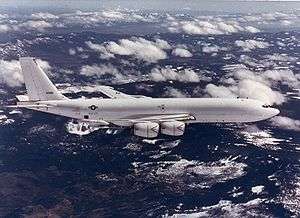
Fleet Air Reconnaissance Squadron ONE is the Navy's only land-based signals intelligence (SIGINT) reconnaissance squadron. The 13 aircraft in the Navy's inventory are based on the Orion P-3 airframe and provide fleet and theater commanders worldwide with near real-time tactical SIGINT. With sensitive receivers and high-gain dish antennas, the EP-3E exploits a wide range of electronic emissions from deep within targeted territory.
Fleet Air Reconnaissance Squadrons THREE and FOUR provide communications relay and strategic airborne command post missions. They provide survivable, reliable, and endurable airborne command, control, and communications between the National Command Authority (NCA) and U.S. strategic and non-strategic forces. The TACAMO ("Take Charge and Move Out") mission links the NCA with naval ballistic missile submarine forces during times of crisis. The aircraft carries a very low frequency communication system with dual trailing wire antennae. The E-6B is a dual-mission aircraft, capable of fulfilling the airborne strategic command post mission and is equipped with an airborne launch control system (ALCS), which is capable of launching U.S. land based intercontinental ballistic missiles.[8]
Fleet Air Reconnaissance Squadron SEVEN is the E-6B Fleet Replacement Squadron, providing initial and requalification training for pilots, aircrews, and maintainers. It operates E-6B's on loan from VQ-3 and VQ-4, having returned its leased Lauda Air 737-600.
| Squadron Name | Insignia | Nickname | Aircraft | Notes |
|---|---|---|---|---|
Established 1 June 1955 | ||||
Established 1 July 1968 | ||||
Established 1 July 1968 | ||||
FRS Tinker AFB Re-designated VQ-7 1 November 1999 | ||||
Fleet Fighter Composite

Fleet Fighter Composite squadrons provide adversary simulation for fleet squadrons. All VFC squadrons are from the Navy Reserve.
| Squadron Name | Insignia | Nickname | Aircraft | Notes |
|---|---|---|---|---|
NAS Oceana | ||||
NAS Fallon | ||||
NAS Key West | ||||
Fleet Logistics Support



Fleet Logistics Support squadrons operate Navy unique airlift aircraft on a worldwide basis to provide responsive, flexible, and rapidly deployable air logistics support required to sustain combat operations from the sea. During peacetime, squadrons provide air logistics support for all Navy commands as well as provide continuous quality training for mobilization readiness. Fleet Logistics Support squadrons have no counterpart in the Regular Navy. They represent 100% of the Navy's medium and heavy intra-theater airlift, and operate year-round, around the world providing the critical link between deployed seagoing units and air mobility command logistics hubs. VR-1 provides dedicated airlift support to the Office of the Secretary of the Navy, Chief of Naval Operations and Commandant of the Marine Corps. All VR squadrons are from the Navy Reserve.
| Squadron Name | Insignia | Nickname | Aircraft | Notes |
|---|---|---|---|---|
C-37B |
Andrews AFB | |||
NAS Fort Worth (Deactivated Summer 2012) | ||||
Andrews AFB | ||||
MCAS Kaneohe Bay | ||||
McGuire AFB (Relocated from NAS Willow Grove in Mar 2011 (Deactivated Summer 2012)) | ||||
Andrews AFB | ||||
NAS New Orleans | ||||
NAS Point Mugu | ||||
NAS Oceana | ||||
NAS North Island | ||||
NAS Jacksonville | ||||
NAS Fort Worth | ||||
NAS Whidbey Island | ||||
NAS Jacksonville (Relocated from NAS Brunswick in 2009) | ||||
McGuire AFB (Relocated from NAS Willow Grove in Mar 2011) Formerly VP-64 – redesignated 18 Sep 2004 | ||||
Carrier Fleet Logistics Support
There are two Carrier Fleet Logistic Support squadrons - one on each coast. VRC-30 is based at Naval Air Station North Island, VRC-40 is based at Naval Station Norfolk. These squadrons send two-plane detachments with each deploying aircraft carrier. The C-2A Greyhound, more commonly referred to as a "COD" (short for Carrier onboard delivery), is used to deliver high priority parts, supplies, people, and mail to/from the carrier and shore sites near the carrier operating area.
|
|
Patrol
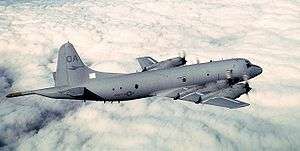
Maritime patrol aircraft are used primarily for reconnaissance, anti-surface warfare and anti-submarine warfare. Volume 2 of the Dictionary of American Naval Aviation Squadrons contains comprehensive histories over 150 patrol squadrons. Its Appendix 7 details the lineage of every VP, VPB, VP(H), and VP(AM) squadron from 1922 through the late 1990s.
| Squadron Name | Insignia | Nickname | Aircraft | Notes |
|---|---|---|---|---|
P-8A |
||||
P-8A |
NAS Jacksonville | |||
NAS Jacksonville | ||||
NAS Whidbey Island | ||||
Other
Some of these organizations are not technically "squadrons", however they have custody of and routinely fly Navy aircraft.
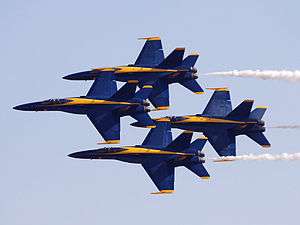
| Squadron Name | Insignia | Nickname | Aircraft | Notes |
|---|---|---|---|---|
C-130T |
NAF El Centro | |||
Topgun Topdome |
F-16 E-2C MH-60S |
|||
Helicopter Squadrons

US Navy helicopters are used for antisubmarine warfare, antisurface warfare, mine warfare, combat search and rescue, special operations, and vertical replenishment missions. The USN helicopter community, in accordance with the "Helicopter Master Plan", is currently undergoing a transformation to reduce costs and infrastructure. The plan calls for expanding warfighting capabilities, modernizing the force, necking down from eight to three aircraft types, and consolidating force structure where possible. This plan is also leading to the renaming of many squadrons.[9] All Navy helicopter (or rotary wing) squadrons' informal names start with the letter "H".
Helicopter Mine Countermeasures Squadron
The Mine Countermeasures Squadrons employ 28 total MH-53E Sea Dragon helicopters. The primary mission of the Sea Dragon is Airborne Mine Countermeasures (AMCM). The MH-53 can operate from carriers and other warships and is capable of towing a variety of mine hunting/sweeping countermeasures systems.[10] The MH-53E Sea Dragon is also a capable heavy-lift asset, with three powerful turboshaft engines and a maximum take-off weight of 69,750 pounds (31,640 kg). This gives the Sea Dragon the capability to carry an impressive amount of cargo, personnel or equipment over long distances. The Sea Dragon remains in service as the Navy's only heavy-lift helicopter and only proven mine countermeasure platform. While not intended to specifically be the MH-53E's replacement, the U.S. Navy's largest-ever helicopter, the new Sikorsky CH-53K King Stallion, intended to start flying its evaluations in 2015, has an increased MTOW figure of some 84,700 lb (38,400 kg), some 14,950 lb (6,781 kg) heavier than the Sea Dragon.

| Squadron Name | Insignia | Nickname | Aircraft | Notes |
|---|---|---|---|---|
NS Norfolk Established 1 Oct 2015 | ||||
Established 12 May 1978 | ||||
Established 2 Jan 1987 | ||||
Helicopter Sea Combat Squadrons
The Helicopter Sea Combat Squadrons combine the strike rescue and ASUW capability of the former Helicopter Anti-submarine squadrons (HS) and the at sea logistics capability of the former Helicopter Combat Support squadrons.[11]

| Squadron Name | Insignia | Nickname | Aircraft | Notes |
|---|---|---|---|---|
FRS NS Norfolk Established 1 Apr 1987 | ||||
FRS NAS North Island Established 1 Sep 1967 | ||||
CVW-2 NAS North Island Established 30 Jun 1952 | ||||
CVW-7 NS Norfolk Established 3 Jan 1956 | ||||
CVW-17 NAS North Island Established 1 Jun 1956 | ||||
CVW-3 NS Norfolk Established 15 Dec 1969 | ||||
CVW-11 NAS North Island Established 1 Nov 1969 | ||||
CVW-8 NS Norfolk Established 18 Jun 1952 | ||||
CVW-1 NS Norfolk Established 27 Jun 1957 | ||||
CVW-5 NAF Atsugi Established 7 Mar 1952 | ||||
CVW-9 NAS North Island Established 10 Jul 1984 | ||||
NAS North Island Established 29 Oct 1971 | ||||
Expeditionary NAS North Island Established 1 Oct 1977 | ||||
NS Norfolk Established 29 Sep 2006 | ||||
NAS North Island Established 29 Sep 2006 | ||||
Expeditionary Andersen AFB Established 3 Feb 1984 | ||||
Expeditionary NS Norfolk Established 1 Sep 1967 | ||||
Expeditionary NS Norfolk Established 3 Dec 1984 | ||||
Expeditionary (USNR) NAS North Island Established 1 Jul 1970 | ||||
Helicopter Maritime Strike Squadrons
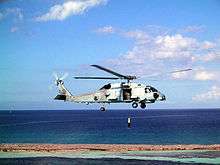
Helicopter Maritime Strike squadrons operate the MH-60R Seahawk. The first operational fleet squadron to receive the Romeo was HSM-71 in fiscal year 2008. The new squadron designation was created to reflect the MH-60Rs multi-mission capabilities.[12]
| Squadron Name | Insignia | Nickname | Aircraft | Notes |
|---|---|---|---|---|
NAS North Island Established May 2, 2013.[13] | ||||
Expeditionary MCAS Kanehoe Bay Established 3 Jul 1975 | ||||
FRS NS Mayport Established 4 Oct 1985 | ||||
FRS NAS North Island Established 21 Jan 1983 | ||||
Expeditionary NS Mayport Established 7 Apr 1988 | ||||
Expeditionary NS Mayport Established 7 Sep 1989 | ||||
Expeditionary NAS North Island Established 23 Mar 1990 | ||||
Expeditionary NAF Atsugi Established 1 Oct 1991 | ||||
Expeditionary (USNR) NAS Jacksonville Established 1 April 2001 | ||||
NAS Jacksonville Established 12 Feb 2009 | ||||
NAS North Island Established 1 Mar 2012 | ||||
CVW-7 NAS Jacksonville Established 5 Oct 1984 | ||||
CVW-17 NAS North Island Established 5 Oct 1984 | ||||
CVW-3 NAS Jacksonville Established 21 Aug 1986 | ||||
CVW-11 NAS North Island Established 3 Oct 1986 | ||||
CVW-5 NAF Atsugi First LAMPS squadron deployment aboard carrier[14] Established 25 Sep 1987 | ||||
NAS North Island Established 1 Mar 2012 | ||||
NAS North Island Established 2 Jun 2016 | ||||
NS Mayport | ||||
NAS North Island | ||||
Training Squadrons
Fixed Wing Training Squadrons
There are three types of fixed wing training squadrons - Primary, Intermediate, and Advanced - that train Student Naval Aviators to become United States Naval Aviators and Naval Flight Officers in the Navy, Marine Corps, and Coast Guard. Navy training aircraft are typically painted orange and white, the exception are the T-6As flown by TRAWING Six. The T-6As were procured along with the USAF's T-6As and are painted in the same blue and white color scheme as the USAF's T-6As.



| Squadron Name | Insignia | Nickname | Aircraft | Notes |
|---|---|---|---|---|
Re-designated VT-2 on 1 May 1960 Primary TRAWING 5, NAS Whiting Field | ||||
Re-designated VT-3 on 1 May 1960 Primary TRAWING 5, NAS Whiting Field | ||||
Re-designated VT-4 on 1 May 1960 (Inactive Dec 2010 - Jun 2013) NFO Advanced MPA, TACAMO, AEW TRAWING 6, NAS Pensacola | ||||
Established 1 Jul 56, redesig to VT-6 on 1 May 1960 Primary TRAWING 5, NAS Whiting Field | ||||
Established 1 Jun 58, redesig to VT-7 on 1 Jul 1960 Intermediate Tailhook, Advanced Jet TRAWING 1, NAS Meridian | ||||
Established 2 Aug 71, redesig to VT-9 on 1 Oct 1998 (2nd Training Squadron desig VT-9) Intermediate Tailhook, Advanced Jet TRAWING 1, NAS Meridian | ||||
Established Jun 1960, redesig to VT-10 on 15 Jan 1968 NFO Primary/Intermediate TRAWING 6, NAS Pensacola | ||||
Established Apr 1951, redesig VT-21 on 1 May 1960 Intermediate Tailhook, Advanced Jet TRAWING 2, NAS Kingsville | ||||
Established 13 Jun 1949, redesig VT-22 on 1 May 1960 Intermediate Tailhook, Advanced Jet TRAWING 2, NAS Kingsville | ||||
Established 11 Jul 1951, redesig VT-27 on 1 Jul 1960 Primary TRAWING 4, NAS Corpus Christi | ||||
Re-designated to VT-28 on 1 May 1960 Primary TRAWING 4, NAS Corpus Christi | ||||
Established Feb 1958, redesig VT-31 on 1 May 1960 Advanced Multi-engine TRAWING 4, NAS Corpus Christi | ||||
Established 29 Oct 1999 TRAWING 4, NAS Corpus Christi | ||||
Established 5 Jun 1972 TRAWING 6, NAS Pensacola | ||||
Helicopter Training Squadrons
The United States Navy's Helicopter Training Squadrons provide advanced helicopter flight instruction to all Navy, US Marine Corps, and United States Coast Guard helicopter flight students as well as international students from several allied nations after completion of primary flight training in one of the VT squadrons. Students who successfully complete the program earn the right to wear the coveted "Wings of Gold."[15] and will receive orders to their selected aircraft's FRS.
| Squadron Name | Insignia | Nickname | Aircraft | Notes |
|---|---|---|---|---|
TRAWING 5 NAS Whiting Field Established 3 Dec 1950 | ||||
NAS Whiting Field Established 1 Mar 1972 | ||||
NAS Whiting Field Established 2 May 2007 |
UAV Squadrons
Fleet Composite squadrons' primary missions include providing fixed wing and helicopter services to the Fleet in support of the United States and Allied operational training exercises and operating the Navy's only operational Unmanned Aerial Vehicle (UAV). This aircraft is utilized primarily in reconnaissance missions. Tactical employment of this unique asset primarily supports both Battle Group deployments and Amphibious Warfare Operations.[16]
Unmanned Reconnaissance Helicopter Squadrons
The Unmanned Reconnaissance Helicopter Squadrons' mission is to support Intelligence, Surveillance, and Reconnaissance demands for conventional forces and special forces. They will be used by HSM and HSC Expeditionary detachments to support Littoral Combat Ship operations and will also be used by unmanned detachments on other aviation capable navy ships.[17] The aviation platforms will consist of the MQ-8B, flown by SH-60 aviators, and the MQ-8C Fire-X, flown by enlisted operators.[18]

| Squadron Name | Insignia | Nickname | Aircraft | Notes |
|---|---|---|---|---|
NAS North Island |
Unmanned Patrol Squadrons
Unmanned maritime patrol aircraft are used for Intelligence, Surveillance, and Reconnaissance.

| Squadron Name | Insignia | Nickname | Aircraft | Notes |
|---|---|---|---|---|
NAS Point Mugu (detachment) To be established in 2014[20] | ||||
Test and Evaluation
Test and Evaluation squadrons test everything from basic aircraft flying qualities to advanced aerodynamics. VX-1 and VX-9 report to the Commander, Operational Test and Evaluation Force (OPTEVFOR).

See also
- Naval aviation
- List of inactive United States Navy aircraft squadrons
- Modern US Navy carrier air operations
- List of military aircraft of the United States (naval) / List of US Naval aircraft
- United States Naval Aviator
- Naval Flight Officer
- United States Marine Corps Aviation
- NATOPS
References
- ↑ "EA-18G Growler electronic warfare aircraft". USN Fact File. United States Navy.
- ↑ "US Navy retires Prowler electronic attack aircraft after close to 45 years' service - IHS Jane's 360". www.janes.com. Retrieved 2015-07-04.
- ↑ "E-2 Hawkeye early warning and control aircraft". USN Fact File. United States Navy. 5 February 2009. Retrieved 2014-10-20.
- ↑ http://www.cnas.org/sites/default/files/publications-pdf/CNAS_CarrierAirWing_white.pdf
- ↑ http://www.gao.gov/assets/250/243745.pdf
- ↑ A, C, and E models are single seat. B, D, and F models are two seat.
- ↑ "F/A-18 Hornet strike fighter". USN Fact File. United States Navy.
- ↑ "E-6B Airborne Command Post (ABNCP)". United States Strategic Command.
- ↑ "The Helicopter Master Plan". Federation of American Scientists.
- ↑ "MH-53E Sea Dragon". USN Fact File. United States Navy.
- ↑ "Helicopter Sea Combat Wing, Pacific COMHELSEACOMBATWINGPAC". Global Security.
- ↑ All existing Helicopter Anti-Submarine Squadrons (Light) (HSL) transitioned to Helicopter Maritime Strike Squadrons. "MH-60R Seahawk". USN Fact File. United States Navy.
- ↑ London, Christina. "Navy Drone Squadron First of Its Kind." NBC San Diego, 3 May 2013.
- ↑ Utz, Curtis A; Mark L Evans; Dale J Gordon (July–August 2005). "The Year in Review 2004" (PDF). Naval Aviation News. United States Navy: 37.
- ↑ "Helicopter Training Squadron 8". Global Security.
- ↑ "Fleet Composite Squadron SIX". U.S. Navy. Global Security.
- 1 2 OPNAV Notice 5400. 14 August 2012
- ↑ Stewart, Joshua. "New squadron to deploy, train unmanned helicopter pilots." Navy Times. 30 August 2012.
- ↑ Burgess, Richard. B. Seapower Magazine. "Navy Plans for Poseidon Crew Control of Triton UAV." August 13, 2013. http://www.seapowermagazine.org/stories/20130813-triton.html.
- ↑ Stewart, Joshua. "UAV squadron to stand up Oct. 1; 1st since 2007." February 5, 2013. http://www.armytimes.com/article/20130205/NEWS/302050316/.
- 1 2 "Naval Air Station Patuxent River Base Guide". DCMilitary.com. Comprint Military Publications. 2008-08-12. Retrieved 2008-12-01.
- ↑ "VX-20 Aircraft Platforms". Air Test and Evaluation Squadron TWO ZERO. United States Navy. 2006-06-10. Archived from the original on August 28, 2009. Retrieved 2008-12-01.
- ↑ Carlson, Ted (Spring 2005). "HX-21 - Blackjack". Wings of Gold. Association of Naval Aviation. Retrieved 2008-12-01.

_Whiting_Field%2C_makes_a_landing_aboard_the_Navy_Helicopter_Landing_Trainer_(HLT)_IX-514.jpg)
